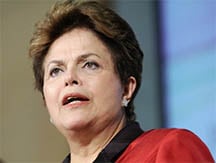Brazilian President Dilma Rousseff’s angry denunciation of US electronic spying at the United Nations General Assembly in New York this week was applauded by most in the room, but her proposal to regulate the Internet should make all of us very nervous.
During her opening speech at the 68th UN General Assembly on Tuesday, Rousseff referred to the recent leaks by former US intelligence contractor Edward Snowden showing that the US government had intercepted electronic communications from top Brazilian officials, including herself, and from Brazil’s state-controlled oil company, Petrobras.
“The revelations of activities of a global network of electronic espionage have caused indignation and repudiation in public opinion around the world,” Rousseff said. “That is a breach of international law, and is an affront to the principles that must guide the relations among [countries,] especially among friendly nations.”
 So far so good. Until that point it was hard to disagree with Rousseff.
So far so good. Until that point it was hard to disagree with Rousseff.
Even if US officials say privately that all countries intercept other nations’ communications, and that the US government has a duty to protect its citizens from terrorist attacks by conducting intelligence activities abroad, these arguments sound pretty hollow in the case of Brazil.
While Brazilian diplomacy often sides with radical dictatorships, and Brazil shows a near total disregard for the collective defence of human rights and democracy in other countries, it is a democratic country at home, and is hardly a haven for terrorists.

But immediately after her denunciation of US spying in her speech, Rousseff went on to say that the world needs “multilateral mechanisms” to regulate the Internet. She added that the United Nations should play a leading role in creating these mechanisms.
“The United Nations should have a leading role in efforts to regulate the states’ behaviour regarding these technologies,” she said. Brazil will propose a “responsible regulation” of the Internet to prevent bad practices, she added.
The trouble with this proposal is that Brazil, Russia, China, South Africa and India have been making proposals to regulate the Internet since 2005, and they are generally scary, freedom of speech advocates say. While paying lip service to freedom of expression, the proposals would effectively lead to censorship, the advocates say.
Last December, at a major UN World Conference of the International Telecommu-nication Union in Dubai, some of the countries demanding Internet regulation proposed a resolution to regulate “unsolicited bulk electronic information,” or spam emails.
The United States and several European countries objected, arguing that China and Russia’s interpretation of “spam” could lend itself to censorship.
China, which censors Facebook, Twitter, and many web pages that it considers as going against its national interests, could include political and religious Internet sites in its definition of spam in the proposed new treaty to regulate the Internet, critics said.
Freedom of expression advocates say that Brazil’s proposals to regulate the Internet are much more respectful of individual freedoms than China’s or Russia’s. But freedom advocates are nevertheless worried.
“The Internet functions best under a decentralized system of government that involves the participation of experts, human-rights advocates and the technical community,” says Emma Llanso, of the Washington, DC-based Center for Democracy and Technology, an Internet freedom advocacy group.
She added, “I would have concerns about any framework that puts governments in charge, and leaves civil society out of the process.”
My opinion: Rousseff’s call for “multilateral mechanisms” to regulate the Internet should not be automatically dismissed, because there are some aspects of the Internet — such as electronic spying, child pornography or financial fraud — that will require some form of international oversight.
But putting that task in the hands of the United Nations, where China, Russia and its authoritarian friends wield enormous power, is a very bad idea. It would allow these countries to do abroad what they do at home: censor what people can read or watch on the Internet.
You are right to be angry about electronic spying, President Rousseff, and you may be right about the need to set some international guidelines to stop it. But allowing the United Nations to take the lead on this would most likely give too much power to governments, and too little to freedom-of-expression and other private sector and civil society groups.
It would mark the end of freedom of expression on the Internet for the part of the world that still enjoys it.
© The Miami Herald, 2013. Distributed by Tribune Media Services.




